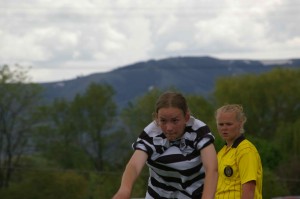When I was ten years old, I started playing competitive soccer. I continued, learning to understand and play the game from the spectator’s and participant’s point of view, for three years. As a spectator, I hardly noticed the referees unless someone was yelling at them. As a player, I watched them more since they controlled the game. I didn’t know what most of the signals meant, or even why they needed to have numbers for the players. I knew referees helped to keep the game moving and since they had the final say over any disputed play, they helped keep the players more friendly toward one another. The referees were almost always official, but friendly. I was always glad when the referee was still friendly to me even if they had just had to speak firmly to my coach.
(Me, just after a header. I had no idea the referee was behind me.)
When I turned thirteen, my family decided that having to attend soccer practice three times a week, games every weekend, and frequent tournaments took up too much of our time together. My sister and I had learned enough that, if we wanted to, we could still improve our skills by practicing at home with our family. So, while it had been a fun experience to play competitive soccer, we all agreed that it was time for a break.
About a year after ending our involvement with any large soccer organizations, I decided that I would like to train to be a soccer referee. For a while I had been hoping that a job of some sort would present itself, so as to enable me to earn some money over the weekends. Three of my older siblings had become certified referees three years earlier. I hoped that if I was also certified, we could officiate together. There were many times when they would come home from refereeing and hold lengthy discussions about the decisions they had made during their games. I understood most of what they said, but was curious to know more than what they explained to me. During these conversations, my siblings spoke of getting a good experience for dealing with people later in life. I welcomed a chance to prepare for life as an adult.
The first step to becoming certified was attending a class. I studied for three days before the test. The first two days I was only in class for four hours. The third day we studied and reviewed from eight o’clock AM till noon, then took the test after a lunch break. I found it difficult to sit in one place and position for so long, but there were occasional breaks that gave me an opportunity to do some stretching. I was surprised at how much I had already learned from listening to my siblings and was glad to learn what I had not heard about. After this class, I did not feel entirely prepared to referee an official game, but I thought I knew the laws well enough to do it without too many mistakes. I practiced and tested my knowledge by getting my siblings to ask me questions that have to be answered in the referee’s head during the game. I also had their help knowing how to hold my flag as an assistant and my arm as a center. I have since been told many times that making mistakes is just a part of learning to be a referee and that every referee learns something new every game.
Since I began to understand the laws of soccer, I have enjoyed watching it more than I did previously. As a referee I have the opportunity to see more games and continue to improve my knowledge of the sport. Refereeing also gives me a goal for when I am doing other exercise. For instance, sprinting is good practice for assistant refereeing.
Most games have three officials, a center referee, and two assistants. The center referee (commonly known as the center) makes sure that all the players and the field are properly equipped, to ensure that the game can be played as safely as possible. The center does not allow the game to start if the field is not safe to play on. Sometimes the coaches seem to think that referees are picky, but all the officials usually have to deal with rude behavior from at least one person every game. I have only once been personally insulted by a coach, but almost every game at least one coach yells rudely at the center. Since the three referees work together as one unit, the assistants are also sensible of the coaches’ harsh words. However, many coaches are also respectful, and they are greatly appreciated by referees.
Being a referee requires great concentration when there are large numbers of people arguing with each other and you. The parents are usually more friendly the younger the age group playing is. Throughout the masses of parents, there are only a few who know the laws of the game well enough to understand the calls of the referee. Those who have refereed and know the frustration that can be caused by audible disagreement with the referee, make up a miniscule portion of onlookers. Some parents have been quite rude, while others are kind, but it is impossible to know what to expect until the game starts. In this league, if there is a problem with a coach or a parent, the center speaks to the coach. The center gains the attention of the coach, then tells them that whoever is creating the problem needs to stop. If possible, this should be done at a time when the play has stopped. If the problem continues, the referee tells the coach that the game will not continue until the person causing trouble has left the area of the field. If the person stops the behavior or leaves after these cautions, the game continues. In an instance where the trouble is not checked, after due warning, the referees may leave the field, terminating the game. When situations such as these occur, the referee does not have the responsibility of deciding what is to be done after the game so as to discourage such behavior. The only thing the referee has to do is report what happened, then someone else decides what is to be done next.
An assistant referee’s most important duty is watching for offside, but they also help the center referee call fouls and when the ball is in and out of play. The assistants run one along each sideline. One running from a goal line along the sideline to the midline, and the other assistant runs from the opposite goal line to the midline on the other side of the field. The spectators sit on one side of the field and the coaches and players sit on the other. I have never been personally insulted by a coach when I was assisting, but there have been four times when I was assisting and was directly spoken to with disapproval. All of the times the person accidentally made it quite clear thy didn’t know nearly enough about the laws to know what they were talking about. It is amusing, but at the same time sobering, that people so often choose to be confrontational, especially about a game. There have been times even in the first season when I nearly burst out sobbing in the middle of the game because of what someone said, but that is almost invariably replaced by a broad grin as the same person says something about the game that doesn’t make any sense.
Many times, the parent’s view of the game is formed by what is told them by their child, while the child forms their knowledge based on what is said by the coaches. During a game, the players are at least respectful until a call they disagree with is made. Throughout most games if the players disagree with the referee’s calls, every player on the bench will protest by saying, “What!?”. It is very common, but almost never fails to amuse me. Many times when I have assisted on the coaches’ and players’ side, there has been a row of colored shirts that stands up in protest just behind me. It is especially amusing when I have seen the foul very clearly from across the field and they deny its occurrence. I have a hard time imagining that they didn’t see the other person flying through the air behind their team mate. They do not seem to realize that without the referee they wouldn’t be playing.
If any of the above mentioned protests are aimed at the assistant in such a way as to prevent them from concentrating on the game, they present their problem to the center. It is the center referee’s responsibility to make sure that their assistants can do their job without interference. Once the assistant speaks to the center about the problem, the center decides what is to be done to fix it for the duration of the game. I have almost always felt supported by the center when I was being an assistant referee.
I have only refereed for one season, but I plan to continue at least until I go to college and possibly some while attending college. In the mean time, I hope to continue to improve my understanding of the game of soccer. I still have much to learn to know how to be official and friendly at the same time, as well as how to deal with the situations I find myself in. I have enjoyed most of the experience of refereeing thus far and I think I will enjoy it even more as I move to refereeing higher leveled games. I am glad to help give other people the chance to play soccer. After all, I would not have been able to play when I did, if other referees had not been willing to endure the parents and coaches when I was playing.


